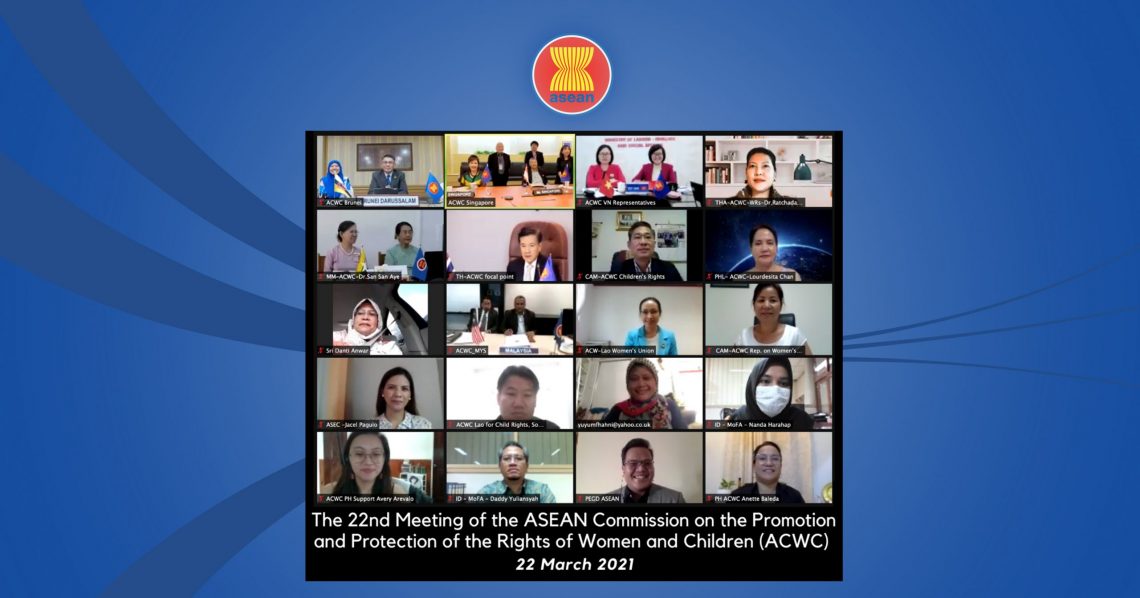JAKARTA, 22 March 2021 – ASEAN is leading the advancement of the rights and welfare of women and children in ASEAN through the ASEAN Commission on the Promotion and Protection of the Rights of Women and Children (ACWC).
Convened on 22 March 2021 for its 22nd ACWC Meeting via video conference, the ACWC Representatives from all ten Member States continuously engaged in meaningful conversation to leverage the work of ACWC towards ensuring that no woman and child will be left behind.
In charting a more inclusive, gender-responsive and child-friendly outcome from the initiatives of ACWC, the Meeting deliberated on the finalisation of the ACWC Work Plan 2021-2025, and continued the implementation of the ASEAN Regional Plan of Action on the Elimination of Violence against Women (RPA on EVAW) and the ASEAN Regional Plan of Action on the Elimination of Violence against Children (RPA on EVAC). The next work plan will play a vital role in strengthening ACWC’s efforts to promote and protect the rights of women and children, implement the ASEAN Gender Mainstreaming Strategic Framework, empower women and children as agents of change, build capacities of the Member States, oversee the implementation of the Declaration on the Protection of Children from All Forms of Online Exploitation and Abuse in ASEAN and the ASEAN Declaration on the Rights of Children in the Context of Migration through the development of the Regional Plan of Action for the Protection of Children from All Forms of Online Exploitation and Abuse in ASEAN (2021-2025) and the Regional Plan of Action on Implementing the ASEAN Declaration on the Rights of Children in the Context of Migration, and ensure a gender-responsive and child-friendly COVID-19 recovery process.
The ACWC also discussed the emerging needs of women and children due to exacerbated vulnerabilities of women and children that include risks from online abuse and bullying.
“It is imperative that women and children are placed at the heart of ASEAN efforts to building back better in post-pandemic era. Therefore, the ACWC is being mindful and decisive of the critical actions that it will take in the next five years to adapt to emerging issues confronting women and children in ASEAN,” said Dato Junaidi Abd. Rahman, the ACWC Chair and Brunei Darussalam’s Representative for Children’s Rights.
In close collaboration with other ASEAN Sectoral Bodies and key development partners, the ACWC will continue to fulfil its mandate to achieve protection and empowerment of all women and children, and contribute to the implementation of cross-sectoral and cross-pillar initiatives. These include, among others, trafficking in persons, women, peace and security agenda, migration, social protection, disability inclusion, legal recognition in relation to the issue on statelessness, and sustainable development.
The ACWC recognised the continued support and readiness for cooperation of UNICEF, UNHCR, and CRC Asia during the Open Session of the 22nd ACWC Meeting, and looked forward to realising the expressed commitments of the development partners in the implementation of the ACWC Work Plan 2021-2025.
Moving forward, ASEAN, together with the ACWC, will remain inspired by the ambitions in the SDGs situated in the context of the COVID-19 challenges and opportunities.
- ABOUT ASEANThe Association of Southeast Asian Nations, or ASEAN, was established on 8 August 1967 in Bangkok, Thailand, with the signing of the ASEAN Declaration (Bangkok Declaration) by the Founding Fathers of ASEAN: Indonesia, Malaysia, Philippines, Singapore and Thailand. Brunei Darussalam joined ASEAN on 7 January 1984, followed by Viet Nam on 28 July 1995, Lao PDR and Myanmar on 23 July 1997, and Cambodia on 30 April 1999, making up what is today the ten Member States of ASEAN.Menu
- WHAT WE DO
ASEAN organs always strive to achieve ASEAN’s goals and objectives, the Secretary-General of ASEAN and the ASEAN Secretariat shall be functioned as coordinating Secretariat to help facilitate effective decision-making withing and amongst ASEAN bodies. In addition, each Member State shall appoint a Permanent Representative to liaise with Secretary-General of ASEAN and the ASEAN Secretariat
Menu - WHO WE WORK WITH
ASEAN shall develop friendly relations and mutually beneficial dialogues, cooperation and partnerships with countries and sub-regional, regional and international organisations and institutions. This includes external partners, ASEAN entities, human rights bodies, non-ASEAN Member States Ambassadors to ASEAN, ASEAN committees in third countries and international organisations, as well as international / regional organisations.
Menu - OUR COMMUNITIES
The rodmap for an ASEAN Community (2009-2015) was declared by the leaders in 2009. The ASEAN Community, anchored on three community pillars: Political-Security Community, Economic Community, Socio-Cultural Community was launched in 2015. The ASEAN 2025: Forging Ahead Together was introduced in 2015 as a Post-2015 Vision. It comprises the ASEAN Community Vision 2025, the ASEAN Political-Security Community Blueprint 2025, the ASEAN Economic Community Blueprint 2025 and the ASEAN Socio-Cultural Community Blueprint 2025
Menu - SITEMAP





